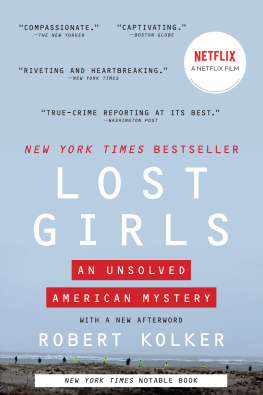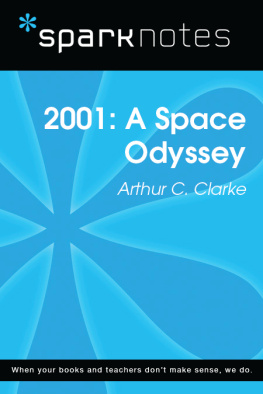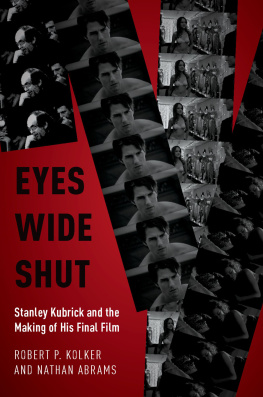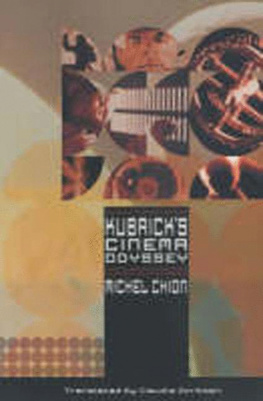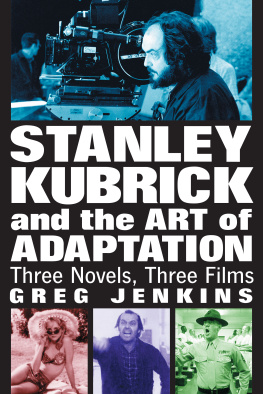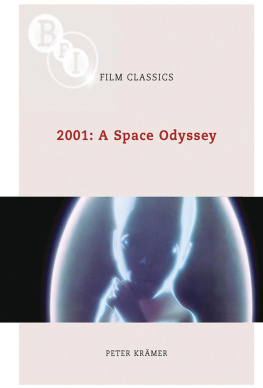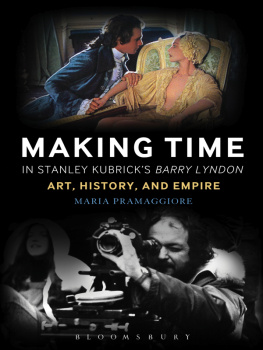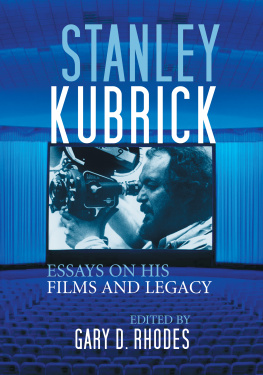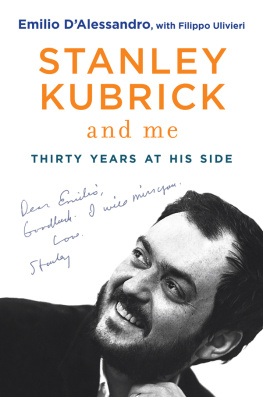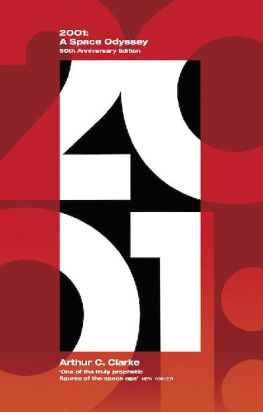Kolker - Stanley Kubricks 2001: a space odyssey: new essays
Here you can read online Kolker - Stanley Kubricks 2001: a space odyssey: new essays full text of the book (entire story) in english for free. Download pdf and epub, get meaning, cover and reviews about this ebook. City: USA;Palo Alto;Calif, year: 2007;2006, publisher: Oxford University Press;Ebrary, genre: Romance novel. Description of the work, (preface) as well as reviews are available. Best literature library LitArk.com created for fans of good reading and offers a wide selection of genres:
Romance novel
Science fiction
Adventure
Detective
Science
History
Home and family
Prose
Art
Politics
Computer
Non-fiction
Religion
Business
Children
Humor
Choose a favorite category and find really read worthwhile books. Enjoy immersion in the world of imagination, feel the emotions of the characters or learn something new for yourself, make an fascinating discovery.

- Book:Stanley Kubricks 2001: a space odyssey: new essays
- Author:
- Publisher:Oxford University Press;Ebrary
- Genre:
- Year:2007;2006
- City:USA;Palo Alto;Calif
- Rating:5 / 5
- Favourites:Add to favourites
- Your mark:
- 100
- 1
- 2
- 3
- 4
- 5
Stanley Kubricks 2001: a space odyssey: new essays: summary, description and annotation
We offer to read an annotation, description, summary or preface (depends on what the author of the book "Stanley Kubricks 2001: a space odyssey: new essays" wrote himself). If you haven't found the necessary information about the book — write in the comments, we will try to find it.
Kolker: author's other books
Who wrote Stanley Kubricks 2001: a space odyssey: new essays? Find out the surname, the name of the author of the book and a list of all author's works by series.
Stanley Kubricks 2001: a space odyssey: new essays — read online for free the complete book (whole text) full work
Below is the text of the book, divided by pages. System saving the place of the last page read, allows you to conveniently read the book "Stanley Kubricks 2001: a space odyssey: new essays" online for free, without having to search again every time where you left off. Put a bookmark, and you can go to the page where you finished reading at any time.
Font size:
Interval:
Bookmark:
STANLEY KUBRICKS 2001: A SPACE ODYSSEY
NEW ESSAYS
EDITED BY ROBERT KOLKER


Oxford University Press, Inc., publishes works that further
Oxford Universitys objective of excellence
in research, scholarship, and education.
Oxford New York
Auckland Cape Town Dar es Salaam Hong Kong Karachi
Kuala Lumpur Madrid Melbourne Mexico City Nairobi
New Delhi Shanghai Taipei Toronto
With offices in
Argentina Austria Brazil Chile Czech Republic France Greece
Guatemala Hungary Italy Japan Poland Portugal Singapore
South Korea Switzerland Thailand Turkey Ukraine Vietnam
Copyright 2006 by Oxford University Press, Inc.
Published by Oxford University Press, Inc.
198 Madison Avenue, New York, New York 10016
www.oup.com
Oxford is a registered trademark of Oxford University Press
All rights reserved. No part of this publication may be reproduced,
stored in a retrieval system, or transmitted, in any form or by any means,
electronic, mechanical, photocopying, recording, or otherwise,
without the prior permission of Oxford University Press.
Library of Congress Cataloging-in-Publication Data
Stanley Kubricks 2001: a space odyssey : new essays/
[edited by] Robert Kolker.
p. cm.
ISBN-13 978-0-19-517452-6; 978-0-19-517453-3 (pbk.)
ISBN 0-19-517452-6; 0-19-517453-4 (pbk.)
1. 2001, a space odyssey (Motion picture) I. Kolker, Robert Phillip.
PN1997.T86S73 2006
791.4372dc22 2005016290
Chapter 9: Excerpt from The Following Story, copyright 1991 by Cees Nooteboom, English translation Harvill 1994, reprinted by permission of Harcourt, Inc.
9 8 7 6 5 4 3 2 1
Printed in the United States of America
on acid-free paper
Thanks to everyone at OUP: copyeditor Merryl Sloane,
production editor Stacey Hamilton, Abby Russell,
and Elissa Morris, a wonderful and gracious editor.
STANLEY KUBRICKS 2001: A SPACE ODYSSEY
ROBERT KOLKER
I first saw 2001 in 1968, on a gigantic Cinerama screen in a London theater. I was overwhelmed by the images and only somewhat impressed by what the images were trying to tell me. I left frankly questioning what all the fuss was about. On subsequent viewings, in slightly more intimate surroundings, on smaller screens back home in New York, the film began to grow and grow on each successive screening. Each viewing opened up more questions and more answersand even more admiration. 2001 became one of the touchstones for my love of film and a major factor in my desire to make the study of film part of my intellectual life. I realized, as I would with all subsequent Kubrick films, that it is a kind of double, triple, quadruple play, revealing more meanings on each viewingand more mysteries.
On its initial release, 2001 was advertised as The Ultimate Trip, a smart appeal to the counterculture of the 1960s. It was played for its spectacle and the psychedelic quality of the images that make up the Stargate sequence near its conclusion. But it was, of course, another film entirely, a deeply serious, richly textured, enigmatic, meditative spectacle of a film, so complex and so unyielding in its answers that its cowriter, science fiction author Arthur C. Clarke, wrote novelizations to try and explain it. Kubrick himself, with the exception of a few tightly controlled interviews, remained silent. Control was the way Kubrick survived as a completely independent filmmaker. He continued to edit 2001 in the projection booth before its New York premiere. He was concerned that it was too long. At one point during its first New York run, a sheet of paper was handed out (I cannot recall if it was signed by Kubrick) to the people on line that explained that Bowmans reentry into the vacuum of the ships airlock was scientifically accurate. Kubrick was very keen on 2001s scientific accuracy. But by and large, the important matters of the filmthe validity of extraterrestrial life, the willingness of humans to devoid themselves of feeling, the relationship of men to machineshe left to the film itself and to an audience that he trusted would stay with it, understand it, even if it provided no final answers to the questions it posed.
I was not the only one who responded to the film with growing enthusiasm and with the experience of seeing something new every time I watched it. 2001 was enormously popular at the time of its release and is now generally regarded as one of the most important films ever made. Significantly, it continues to reveal meaning. Objects and ideas, movements, gestures, and words, invisible once, suddenly become obvious, even though obvious in a film like this does not make them any more comprehensible. Even though its prophetic year has passed, it still speaks to us about our past and future, our relationship to the unknowns of the universe, and cautions us about the ways in which we deal with the technologies we invent.
2001: A Space Odyssey is a film that shows and hides, gives and takes away, promises to reveal great secrets of the universe and then reneges. This is a film of spectacular images developed slowly, contemplatively, even elegiacally. It has little dialogue; it shows more than it tells, and what it shows is not always what we think we see. Kubrick is not being perverse; he was very consciously making a difficult film, which itself is something of a contradiction in terms, since we do not usually equate difficulty with watching a movie. We expect to be given a clear plot and obvious emotion, not confronted with complex ideas and insoluble problems.
In order to understand some of this, it will be helpful to put the film in context, two contexts in fact. One is the cinematic and cultural history that surrounds it; the other is the body of Kubricks workand with the filmmakers death in 1999 after the completion of Eyes Wide Shut, that body of work is complete. Stanley Kubrick is a director to whom the term auteur can be applied with little hesitation. He created and managed every aspect of his films, from inception through advertising and distribution. He often depended on writers to initiate the words of a project, but he created a final shooting script that was to his liking. The shooting itself (during which he would sometimes operate the camera or direct from a distance a second unit, who might be in another country making background shots), the visual design of the film, the actors performances, every detail was under his control. The result is an amazing uniformity of production. Despite the differences in each of his films, they carry forward visual designs and narrative and thematic movements that make all of them cohere as Kubrick films. We need to understand 2001 in this light.
Lets examine briefly a general history of the films that, in important ways, made the creation and reception of Kubricks film possible. 2001 appeared in a decade of intense cinematic experimentation, mostly from abroad. There was, earlier, Italian neorealism. Their country in ruins after World War II, Italian filmmakers turned to filming in the streets with nonprofessional actors, capturing a desolate world and a desperate people in ways that film had never done before. Neorealism influenced, in turn, the French New Wave, a group of film lovers and critics who discovered in American film a vitality and a sense of authorship that they took to heart when it came time to make their own films. These films, like those of the neorealists, were shot on location, and at the same time they grabbed hold of American film genres and turned them inside out. At one time or another during the late 1950s and 1960s, many New Wave directors, especially Jean-Luc Godard and Franois Truffaut, made gangster filmsor at least their version of gangster films, like Godards
Next pageFont size:
Interval:
Bookmark:
Similar books «Stanley Kubricks 2001: a space odyssey: new essays»
Look at similar books to Stanley Kubricks 2001: a space odyssey: new essays. We have selected literature similar in name and meaning in the hope of providing readers with more options to find new, interesting, not yet read works.
Discussion, reviews of the book Stanley Kubricks 2001: a space odyssey: new essays and just readers' own opinions. Leave your comments, write what you think about the work, its meaning or the main characters. Specify what exactly you liked and what you didn't like, and why you think so.

